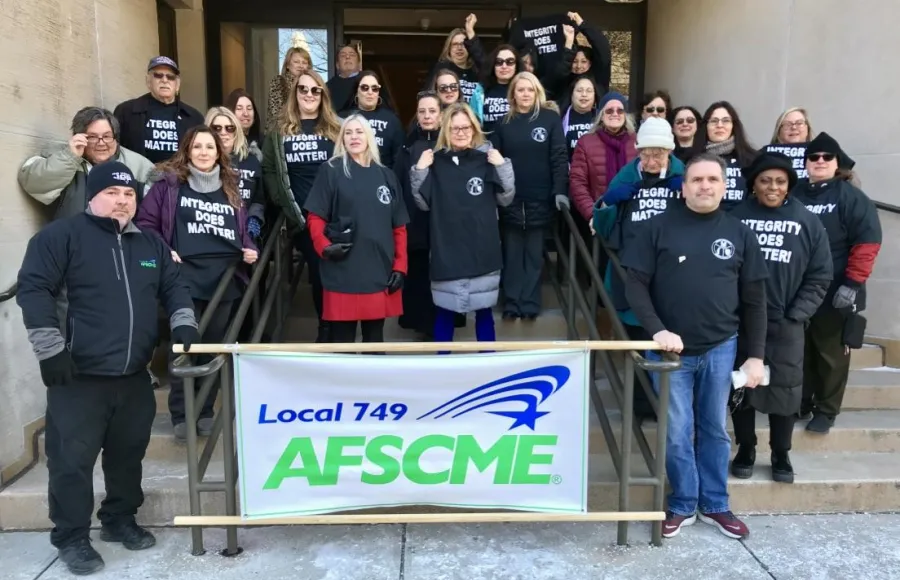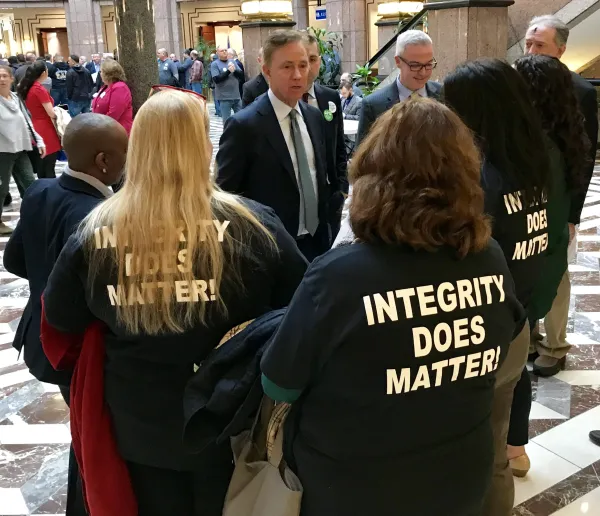Judicial Members: Standing For Justice, Fighting Outsourcing

“Integrity does matter.”
That’s the message AFSCME-represented court recording monitors are delivering to the public and to lawmakers as they press the fight to stop their employer, the Connecticut Judicial Branch, from outsourcing their transcription work to a private company.
The more than 200 court recording monitors, who are members of AFSCME Local 749 of Council 4, say that outsourcing their transcription work will comprise the integrity of trial proceedings, dramatically reduce their income, and leave them vulnerable to layoffs when their collective bargaining agreement expires June 30, 2021.
So they’re pushing back to protect a vital public service.
“Court recording monitors are a cornerstone of each and every courtroom proceeding,” veteran employee Kathy Darling said during a frigid but well-attended rally Feb. 28 on the steps of the New Haven Courthouse. “To make this kind of sweeping change is catastrophic not only to us, but also to Connecticut courts and the people they serve.”
- Click here for press reporting on the New Haven rally.
This year, the Judicial Branch stepped up a nearly decade long pursuit of outsourcing by making it a legislative priority and drafting language within a court operations bill (SB 964) that would serve as a vehicle for taking away the monitors’ work.
- Click here for press reporting on our push back against the Branch's legislative agenda.
The monitors are now pressing their case before legislators. Several of them turned out to testify before the General Assembly’s Judiciary Committee on March 6, urging legislators to ensure any proposed legislation from the Branch is devoid of language that would facilitate privatization.
- Click here to read testimony provided on SB 964, An Act Concerning Court Operations.
“The idea of outsourcing transcripts and taking away an earned income source from committed monitors who have spent years or even decades perfecting our craft is a heartless insult to loyal employees who have spent many week-ends and evenings, on our own time, completing transcripts, meeting deadlines, and perfecting our craft in order to serve the public,” Dorothy Bardling, a court recording monitor in Stamford, told committee members.
Sotonye Otunba-Payne, a long-time court monitor in the New Haven courts, reminded lawmakers that court transcription work must be performed outside the normal daytime court operations, and that monitors are not paid overtime but instead are compensated on a low per-page fee set by state statute.
“Court recording monitors are nearly 100 percent female,” she pointed out. “Outsourcing to a private corporation would be devastating to us, to our families, and to the communities where we live, work and pay taxes.”
Cathy Plavcan, who works in Stamford Superior Court, told Judiciary Committee members that state-employed monitors are invested in protecting the quality work through their courtroom interactions.
“Most people who are attending court proceedings are facing serious and often life-altering situations and the outcome of court proceedings can dramatically impact a person’s personal life and liberty, family, and financial situations,” she testified. “An error in transcription could significantly impact and irreparably harm the very same people we are doing our best to serve.
- Click here for press reporting on the Judiciary Committee hearing.
The persistence and determination shown by the monitors has had an impact. The Branch says that it has stripped from the legislation any language allowing them to outsource transcriptions -- for now.
Union members rightly point out that this a temporary retreat requiring continued vigilance.
“Just because the Branch has removed outsourcing language that was originally in [SB 964] doesn’t mean they won’t pursue it through other means, like the budget bill,” said. Local 749 President Charles DellaRocco. “This fight is far from over.”
Local 749 and Council 4 will continue efforts to stop reckless outsourcing in its tracks with rallies, grass roots legislative lobbying and more.
Click here to tell your legislators to oppose outsourcing court recording monitors.
“Local 749 members are standing up and speaking out for all of us,” said Council 4 Executive Director Jody Barr. “They are demonstrating what engaged union employees can accomplish by sticking together.”

